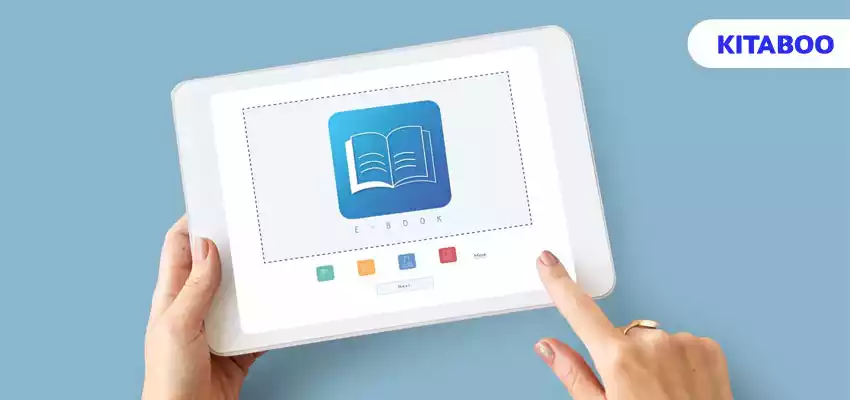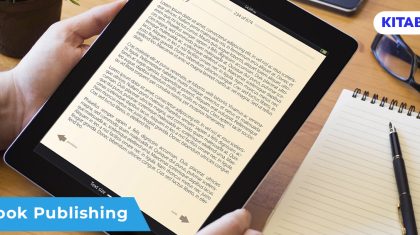
The Benefits of Making a Digital Book
Digital books are electronic versions of regular books that you can read on devices like computers, tablets, or e-readers. These books can include text, images, and interactive features, all stored in a digital format, allowing the convenience of carrying numerous books on a single device.
Making digital books comes with numerous benefits. Instead of flipping through paper pages, users can effortlessly swipe to navigate, enhancing the reading experience. In today’s era, a multitude of online platforms have emerged, enabling authors and teachers to effortlessly make digital books.
According to IndustryARC’s interactive textbook market overview, the global e-textbooks market is expected to reach $3.7 billion by 2026, growing at a CAGR of 7.8% from 2021 to 2026.
Let’s dive into the advantages of making digital textbooks and see how digital textbook platforms are making the education scene look like something out of a sci-fi movie.
Table of Contents
- Interactive Learning Experience
- Flexibility in Content Creation
- Saving Your Wallet and the Planet
- Global Learning Community
- Cross-Platform Compatibilities
- Portability and Accessibility
- Efficient Navigation and Time Optimization
- Real-Time Updates and Revisions
- Cost-Effective Publishing
- Data Analytics for Informed Decision-Making
- Environmentally Friendly
- Enhanced Security and Copyright Protection
- Conclusion
1. Interactive Learning Experience
Digital books and eBooks enrich the learning experience with interactive features, including hyperlinks, multimedia content, and embedded videos. This dynamic approach to content consumption facilitates a deeper understanding of industry trends, fostering continuous professional development.
Traditional textbooks often lack the engagement factor that today’s learners crave. Digital books enable authors and educators to integrate multimedia elements seamlessly.
From videos and audio clips to interactive quizzes, the platform ensures that the learning journey is not only informative but also captivating.
KITABOO is one such digital textbook platform that turns learning into an interactive journey.
2. Flexibility in Content Creation
Creating content on digital textbook platforms is a breeze, offering unparalleled flexibility to authors and educators. The platform supports various file formats, allowing for easy import and customization of existing content. Digital textbook platforms provide a user-friendly interface that ensures that vision comes to life effortlessly.
3. Saving Your Wallet and the Planet
Let’s talk about cash. We all know textbooks can be expensive, right? Making Digital book is not expensive, and helps people save money.
And here’s the eco-friendly twist – no paper, no ink, and no trees are harmed in the making of your digital study material. This financial efficiency allows schools and universities to allocate resources more strategically, potentially improving overall educational quality.
4. Global Learning Community
Digital textbook platforms have the power to dissolve geographical barriers, and are embracing their potential to create a global learning community.
Whether you’re a student in a bustling city or a remote village, as long as you have an internet connection, you are connected to a vast repository of knowledge.
5. Cross-Platform Compatibilities
Making digital books work well on different devices and systems is called cross-platform compatibility. It means people can read the book easily on their phones, tablets, or computers. Cross-platform compatibility is crucial for digital books, ensuring accessibility and ease of use.
6. Portability and Accessibility
Digital books and eBooks offer professionals the freedom to carry an entire library on a slim, portable device. This mobility ensures that essential knowledge and industry insights are accessible irrespective of location, fostering a dynamic and on-the-go learning experience.
Gone are the days of lugging around heavy backpacks filled with textbooks. Digital books become a portable library at your fingertips. The ability to access your content from the cloud means that students, professionals, and avid readers can carry their entire collection wherever they go.
7. Efficient Navigation and Time Optimization
Effortless navigation and bookmarking in digital books and eBooks streamline the reading experience, saving professionals valuable time. The ability to quickly locate specific information or resume reading at a precise point enhances productivity and efficiency in daily tasks.
8. Real-Time Updates and Revisions
Printed books are static, and any updates or revisions require a new edition to be published. Digital platforms have revolutionized this process by allowing real-time updates and revisions. This dynamic approach to content ensures that digital books remain relevant and up-to-date in a rapidly changing world.
9. Cost-Effective Publishing
Traditional publishing involves significant costs related to printing, distribution, and inventory management. Digital platforms eliminate these expenses by providing cost-effective digital publishing solutions. This democratization of publishing fosters a more sustainable and accessible approach to knowledge dissemination.
10. Data Analytics for Informed Decision-Making
Understanding how readers engage with content is crucial for continuous improvement. Analytics tools provide valuable insights into reader behavior, helping authors and educators make informed decisions about content development and instructional strategies. This data-driven approach ensures that digital books can be optimized for maximum impact.
11. Environmentally Friendly
As the world becomes increasingly conscious of environmental sustainability, the shift towards making digital books aligns with eco-friendly practices. Platforms are contributing to this movement by reducing the demand for paper and minimizing the carbon footprint associated with traditional publishing.
12. Enhanced Security and Copyright Protection
Protecting intellectual property is a major concern in the digital age. From encryption to access controls, digital book making platforms ensured that authors and publishers have peace of mind regarding copyright protection. This security framework is essential for fostering a sustainable digital publishing ecosystem.
Conclusion
To sum it up, digital books have lots of good things about them. They make learning more interesting with pictures and videos. Teachers and writers can easily create and change content.
People from all over the world can use them, making education fair for everyone. You can read them on different devices like phones and computers, which is easy and convenient. Digital books also help you find information quickly, get updates, and stay secure. Overall, they bring many benefits to learning in our changing world.
Whether you are an educator looking to transform your teaching materials or an author eager to reach a global audience, KITABOO offers a comprehensive solution to make your digital book journey both seamless and impactful.
So what are you waiting for? Contact us today!
Discover how a mobile-first training platform can help your organization.
KITABOO is a cloud-based platform to create, deliver & track mobile-first interactive training content.



